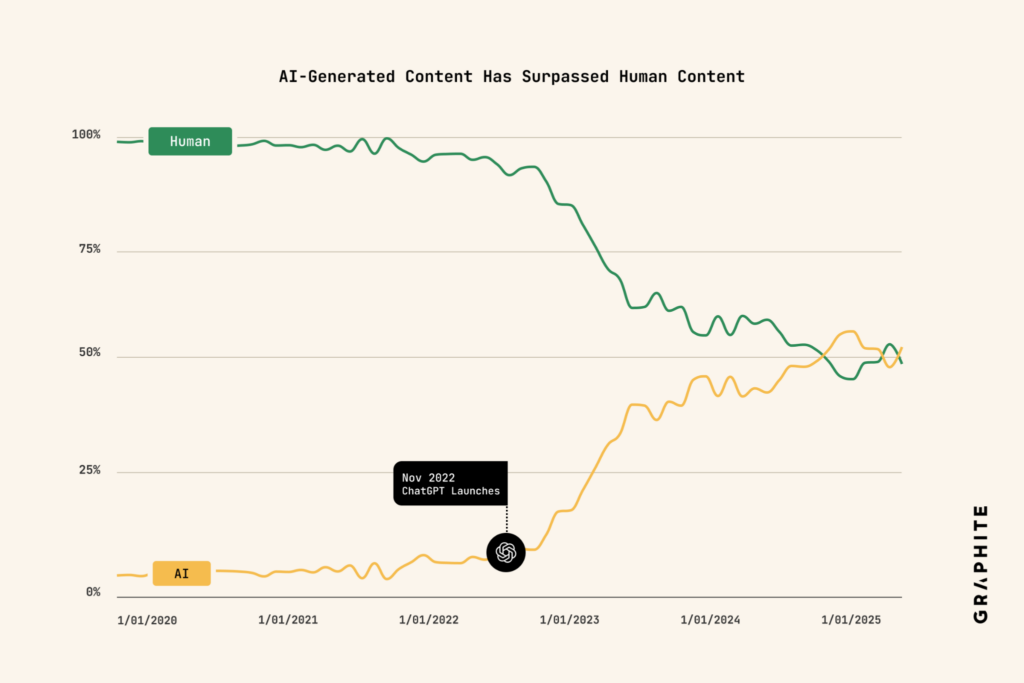Bots Take the Lead Online as Automated Content Reshapes User Experience
Artificial intelligence is reshaping how people experience and interact with the online world. Major platforms now face a surge of non-human traffic and synthetic content, pushing the internet into a stage where real users must question both what—and whom—they are interacting with. Researchers say this shift is eroding trust as machine-generated material spreads across spaces once dominated by people.

In brief
- Automated traffic hit 51% in 2024, marking the first year bots outnumbered human users across major platforms and public networks.
- Machine-written articles surpassed human output in late 2024, adding stronger concerns about authenticity across the online world.
- Users report weaker cues for spotting real people as automated posts copy human behavior and blur the line between real and synthetic.
- More people move to private chats and closed groups as public platforms grow noisier, less trustworthy, and harder to navigate.
Bots Overtake Humans Online, Raising New Questions for Crypto Platforms
Much of the internet still relies on human activity, but recent trends indicate a significant shift toward automation. AI-created posts and bot networks move through social platforms at a pace that makes the digital world feel less human than before. According to researchers, the trend reflects the ideas behind the “Dead Internet Theory,” a once-fringe belief that posits a significant portion of online content is generated by machines mimicking human behavior.
Many dismissed the theory as conspiracy talk when it first surfaced years ago on forums such as 4chan and Agora Road’s Macintosh Café. However, the rising prevalence of automated activity has prompted some experts to reevaluate how unrealistic it once seemed.
Imperva’s 2025 Bad Bot Report found that bots made up 51% of all web traffic in 2024—marking the first time automated systems outnumbered humans . Advanced and moderate bots accounted for 55% of attacks that year, with many built to copy human browsing patterns. These systems can evade detection by mimicking the behavior of ordinary users, making it far harder to identify them.
Basic bot attacks are also on the rise, with automated activity reaching 45% in 2024, up from 40% the previous year. Analysts link the rise to easy-access automation tools that allow less-skilled attackers to run high-volume campaigns with minimal effort.
Synthetic Articles Outpace Human Writers as Trust Declines Online
Apart from automated bot attacks, articles and content trends appear to be following a similar path. Analytics firm Graphite reported that machine-generated articles outnumbered human-written work for the first time in late 2024. The shift adds to growing concerns about authenticity across news sites and social platforms.

Sociologist Alex Turvy explained that, while precise measurement is impossible, clear signs indicate that online spaces are undergoing significant changes. Automated posts now fill comment sections, timelines, and forums, often appearing no different from genuine human input.
Concerns extend beyond traffic numbers, as people now have to rely on subtle behavioral cues to determine whether someone is genuine. Once bots start copying those cues, user confidence begins to weaken. Some users withdraw; others start to question nearly everything they see.
Key pressures shaping the shift include:
- Rising automated activity across major platforms.
- Growing use of tools that imitate human behavior .
- Increasing output of synthetic articles and posts.
- Decreasing reliable signals for identifying real users.
- Rising movement toward smaller, more controlled online communities.
Many users now move to private spaces, such as Discord channels or group chats, where their identity feels easier to confirm. Turvy said communities can adapt, but trust may continue to shrink as automated activity grows . For now, people remain active online, but they face more machine-driven noise than ever before.
Disclaimer: The content of this article solely reflects the author's opinion and does not represent the platform in any capacity. This article is not intended to serve as a reference for making investment decisions.
You may also like
Dogecoin News Today: Dogecoin Faces Key Support Challenge While EV2 Presale Attracts Growing Investor Confidence
- Dogecoin (DOGE) tests critical $0.115–$0.125 support, with a breakdown risking a $0.08–$0.09 decline amid weakening technical indicators. - EV2’s $0.01 presale has raised $400K+ for a Web3 shooter game, attracting investors seeking utility-driven crypto projects. - Grayscale’s DOGE ETF launch and institutional interest contrast with bearish market sentiment and regulatory uncertainties. - CleanCore’s 78% stock drop highlights risks of Dogecoin treasury bets as holdings erode below $0.238 average purchase

Ethereum Updates Today: AI Trends and Meme Craze Drive Crypto's Dramatic Rally Despite Bubble Concerns
- Datavault AI (DVLT) announced a meme coin airdrop for shareholders, boosting shares 4.91% pre-market. - Mutuum Finance (MUTM) raised $18.8M in presale, with 800M tokens sold and potential 500% returns for early buyers. - BitMine Immersion (BMNR) holds 3.6M ETH, citing Ethereum tokenization and regulatory progress as growth drivers. - Digi Power X (DGXX) raised price target to $5, planning 55MW HPC deployment and AI infrastructure shift. - J.P. Morgan warned of AI-driven market bubbles, while Sampo's buyb
Ethereum News Update: Buterin: Ethereum's Privacy Features Require Improved User Experience
- Vitalik Buterin introduces Kohaku, a privacy framework for Ethereum to enhance onchain security and user anonymity. - Launched at the Ethereum Cypherpunk Congress, Kohaku aims to integrate mixnets and ZK browsers while addressing usability gaps in privacy tools. - Buterin highlights the "last mile" challenge: advanced cryptography exists, but user experience remains fragmented with separate seed phrases and limited multi-sig options. - The Ethereum Foundation reinforces privacy as a core right, rebrandin

Ethereum News Today: Ethereum’s Layer-2 Migration: Enhancing Scalability, Diminishing Worth?
- Ethereum (ETH) fell to a four-month low below $3,000, marking its largest single-day drop since November 2025. - Network fundamentals weakened, with Total Value Locked (TVL) dropping 13% to $74 billion and DEX trading volume declining 27% monthly. - Growing migration to layer-2 solutions like Arbitrum and Polygon reduced base-layer fee demand, fragmenting Ethereum's economic model. - Analysts highlight Ethereum's leadership in RWA tokenization but note macroeconomic factors, including U.S. debt dynamics,
